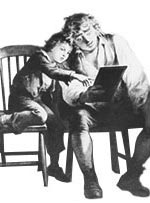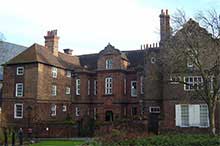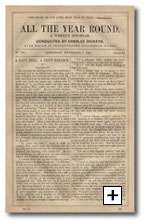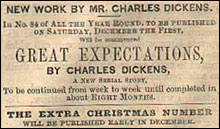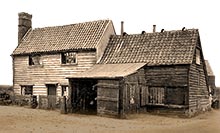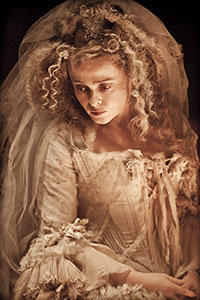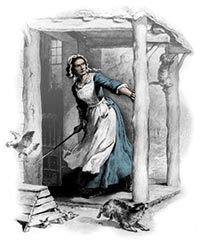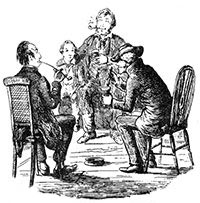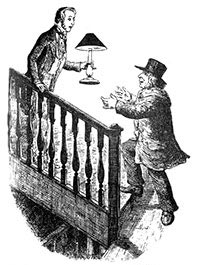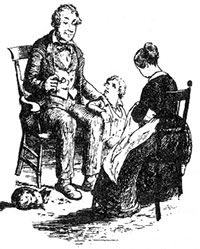Charles Dickens'
Great Expectations
A Masterpiece...and a Bit of Autobiography
Great Expectations - Published in weekly parts Dec 1860 - Aug 1861
Charles Dickens' thirteenth novel was published in Dickens' weekly journal All the Year Round without illustrations. An American edition was also published, curiously, a week in advance of the English version, in Harper's Weekly (Patten, 1978, p. 289).The novel contains a strong autobiographical element, though not as openly as in David Copperfield. Dickens reread Copperfield before beginning Great Expectations to avoid unintentional repetition (Johnson, 1952, p. 965).
Called Dickens' darkest work by some, it was very well received by Victorian readers and remains one of Dickens' most popular works today. Many consider this novel Dickens' greatest use of plot, characterization, and style and Great Expectations the masterpiece of Charles Dickens' works (Davis, 1999, p. 153).
Plot
(contains spoilers)
Pip, an orphan, is brought up by his abusive sister and her husband, Joe Gargery, the kindly village blacksmith. Magwitch, an escaped convict, confronts Pip in the churchyard on the Kent marshes and demands food and a file to break his chains. Out of fear Pip complies and Magwitch escapes. He is soon recaptured and transported to Australia where he prospers.
Pip is introduced to Miss Havisham, an eccentric old woman, and her charge, Estella, with whom Pip falls in love. Estella has been taught by Miss Havisham to break men's hearts as restitution for Miss Havisham's having been left at the altar years before by Compeyson, who later turns out to be a convict who was once partnered with Magwitch.
Pip is apprenticed to Joe but longs to become a gentleman after having been made to feel inferior by Estella who had criticized Pip's "coarse hands and thick boots." He begins to be ashamed of Joe and home and enlists Biddy to help educate him.
Pip and Joe meet the lawyer, Jaggers, at the local pub. Pip recognizes Jaggers as a man he has seen at Miss Havisham's. Jaggers relates to Pip and Joe that Pip has great expectations through an unnamed benefactor which Pip assumes is Miss Havisham. Jaggers tells them that Pip is to be released from his apprenticeship to Joe and become a gentleman and is to go to London to begin his education. As part of the mysterious circumstances of his great expectations Pip is told that he is not to try to discover who his benefactor is.Pip goes to London where Jaggers and his clerk Wemmick set him up to begin his education with Matthew Pocket, who is Miss Havisham's cousin. Pip has chambers with Matthew's son Herbert at Barnard's Inn and discovers Herbert is the "pale young gentleman" he had scuffled with at Miss Havisham's Satis House. Pip's sister, Mrs Joe Gargary, has been attacked by Orlick, a journeyman blacksmith in Joe's shop. She lingers in a state of insensibility and later dies.
Pip continues and finishes his education and secretly sets Herbert up in business. He becomes Estella's escort in London and continues to adore her as she continues to torment him. When Pip turns 21, and reaches his majority, he is told by Jaggers that he is to receive 500 pounds per year from his still unnamed benefactor. Pip wonders when Miss Havisham will make herself known as the provider of his great expectations and he will come into his promised property.
On a stormy night in his 23rd year Pip is home alone and is visited by a man who seems to know him, but whom Pip does not recognize. Finally, to his horror, Pip recognizes the convict Magwitch and, to his further horror, Magwitch relates that it was he who has provided Pip's great expectations. Magwitch has returned to England, in violation of his sentence of transportation, to see the gentleman he has made.Pip learns that Estella will marry the hated Bentley Drummle. Estella quarrels with Miss Havisham over her heartless upbringing. Later Miss Havisham is repentant and begs Pip to forgive her. Pip rescues her when her clothes catch fire but she is badly burned and later dies. Pip's arms were also badly burned and he recovers slowly. Estella's marriage goes badly, she is mistreated by Drummle and she leaves him. Drummle later dies in an accident involving the mistreatment of a horse.
Pip enlists Herbert to help him find lodging to hide the convict, now called Provis, until they can spirit him abroad. They lodge Provis in an upstairs room in a house at Mill Pond Bank, on the Thames, occupied by Herbert's fiancee Clara and her invalid father. They then make plans to take Provis down the river in an open boat and catch a steamer bound for Hamburg.
On the way they are overtaken and Provis identified as the convict Magwitch by Compeyson. Compeyson drowns when he and Magwitch scuffle and fall from the boat. Magwitch sustains serious injury. Despite his health, Magwitch is tried and sentenced to death but dies of his wounds before the execution can be carried out. Pip has learned that Magwitch is Estella's father and, now softened towards the convict, tells him of his daughter just before Magwitch dies.
Magwitch's wealth, which was intended for Pip, is confiscated by the Crown and leaves Pip destitute and ill. Joe comes to care for Pip in his
illness and for a while it is like the old days at the forge. Pip is truly sorry for having forgotten Joe, Biddy and home. When his strength returns he decides to ask Biddy to marry him. On arrival at the forge he finds that Biddy has married Joe.Pip leaves England to take a clerk's position in Herbert's firm. After many years he returns to visit Joe and Biddy at the forge and finds a copy of himself, Joe and Biddy's son, sitting in his old corner in the kitchen firelight. He visits Satis House, now in ruins, and meets a now softened Estella with the "freshness of her beauty gone but its indescribable majesty and its indescribable charm remaining" and sees "no shadow of another parting from her."
Complete List of Characters:
Character description contain spoilersMap of Charles Dickens' Great Expectations Connections
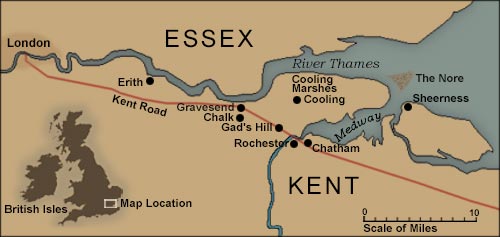
Rochester - Pip's village located near here.
Chalk - Model for Gargery's forge located here. Dickens honeymooned here in 1836.
Cooling - Cooling churchyard is where Pip's family is buried, Pip meets Magwitch here.
Chatham - Dickens lived here as a child.
Gads Hill - Dickens walked with his father by a mansion here as a child. Dickens bought the house in 1856 and lived there the last 12 years of his life.
Kent Road - Route Pip takes between London and home.
Thames - Pip practices rowing between London and Erith. Attempt to escape with Magwitch from London to near the Cooling Marshes.
The Nore - Sandbank off the Isle of Grain.
Great Expectations Links:
Wikipedia
eNOTES
The Victorian Web
BookRags.com - Great Expectations
Bartleby.com
SparkNotes - Excellent!
Universal Teacher Study Guide
Transportation
Transportation was the practice of sending British criminals to the colonies as punishment in the absence of sufficient prisons. Criminals were sent to America until 1776, after that date they were sent to Australia. It is estimated that 140,000 criminals were transported to Australia between 1810 and 1852.
Transported criminals were consigned to private employers for a fixed period of time according to their crimes. Abel Magwitch, in Great Expectations, had been transported to Australia, finished his sentence, and became rich working for himself. Still, his return to Britain was punishable by death until 1834, although the last actual hanging for this offense took place in 1810. Transportation was abolished in 1857 (Wikipedia).
Great Expectations Excerpt:
Dickens hilarious account of the formerly illiterate Joe composing a letter:
Evidently, Biddy had taught Joe to write. As I lay in bed looking at him, it made me, in my weak state, cry again with pleasure to see the pride with which he set about his letter. My bedstead, divested of its curtains, had been removed, with me upon it, into the sittingroom, as the airiest and largest, and the carpet had been taken away, and the room kept always fresh and wholesome night and day. At my own writing-table, pushed into a corner and cumbered with little bottles, Joe now sat down to his great work, first choosing a pen from the pen-tray as if it were a chest of large tools, and tucking up his sleeves as if he were going to wield a crowbar or sledgehammer.It was necessary for Joe to hold on heavily to the table with his left elbow, and to get his right leg well out behind him, before he could begin, and when he did begin, he made every down-stroke so slowly that it might have been six feet long, while at every up-stroke I could hear his pen spluttering extensively. He had a curious idea that the inkstand was on the side of him where it was not, and constantly dipped his pen into space, and seemed quite satisfied with the result. Occasionally, he was tripped up by some orthographical stumbling-block, but on the whole he got on very well indeed, and when he had signed his name, and had removed a finishing blot from the paper to the crown of his head with his two forefingers, he got up and hovered about the table, trying the effect of his performance from various points of view as it lay there, with unbounded satisfaction
(Great Expectations, p. 440).The original manuscript of Great Expectations
Charles Dickens gave the bound manuscript of Great Expectations to his friend Reverend Chauncy Hare Townshend in 1861. When Townshend died in 1868 he bequeathed the manuscript to the Wisbech & Fenland Museum.
- Sketches by Boz |
- Pickwick |
- Oliver Twist |
- Nickleby |
- Old Curiosity Shop |
- Barnaby Rudge |
- Chuzzlewit |
- Christmas Carol |
- Christmas Books |
- American Notes |
- Pictures from Italy |
- Dombey and Son |
- Copperfield |
- Bleak House |
- Hard Times |
- Little Dorrit |
- Tale of Two Cities |
- Great Expectations |
- Our Mutual Friend |
- Edwin Drood |
- Minor Works |
- The Uncommercial Traveller |
- Short Stories

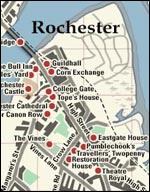
 Miss Havisham has Pip and Estella play Beggar My Neighbor to entertain her. Estella uses the game to make Pip aware of how common he is:
Miss Havisham has Pip and Estella play Beggar My Neighbor to entertain her. Estella uses the game to make Pip aware of how common he is:
